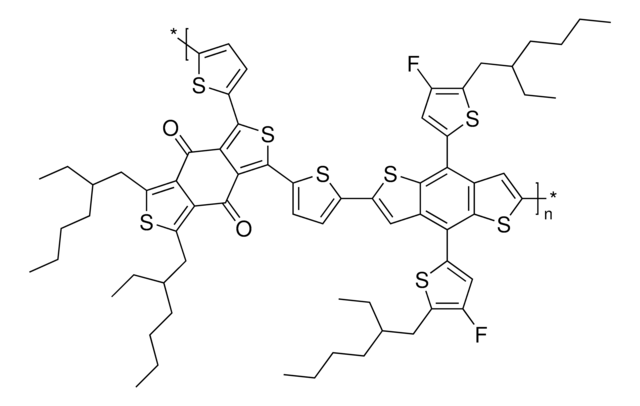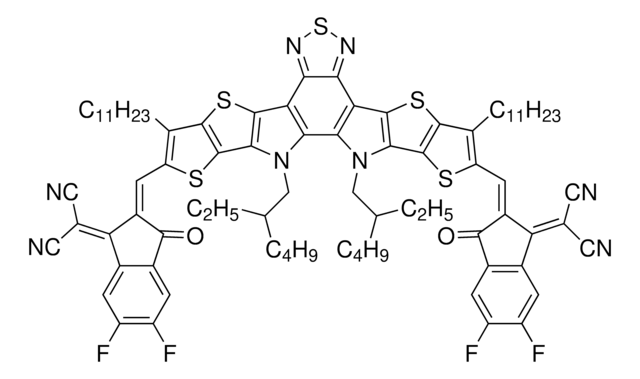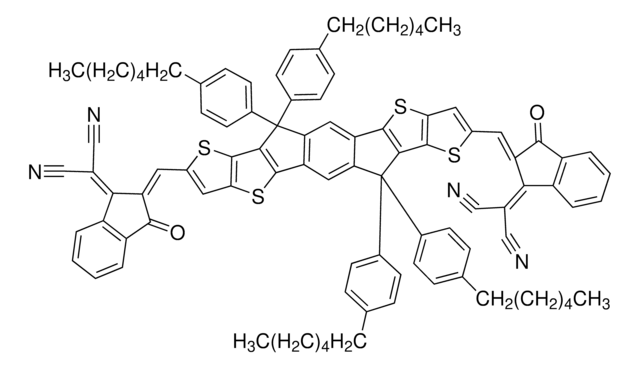906352
PBDB-T-2Cl
Synonym(s):
OS0139, PCE 139, PM 7, Poly[[4,8-bis[5-(2-ethylhexyl)-4-chloro-2-thienyl]benzo[1,2-b:4,5-b′]dithiophene-2,6-diyl]-2,5-thiophenediyl[5,7-bis(2-ethylhexyl)-4,8-dioxo-4H,8H-benzo[1,2-c:4,5-c′]dithiophene-1,3-diyl]-2,5-thiophenediyl]
About This Item
Recommended Products
description
Band gap: 1.95 eV
Solubility:Soluble in 1,2-Dichlorobenzene
form
particles
mol wt
50,000-100,000 g/mol by GPC
color
Fine
solubility
chlorobenzene: soluble
chloroform: soluble
Orbital energy
HOMO -5.52 eV
LUMO -3.57 eV
PDI
2‑4
Application
Polymeric donor material
LUMO=−3.57 eV
HOMO=−5.32 eV
OPV Device Performance :
PBDB-T-2Cl:IT-4F
Voc= 0.86V
Jsc= 21.46 mA/cm2
FF= 0.75
PCE=13.9%
PBDB-T-2Cl (or PM7) is a wide bandgap polymer donor (n-type semiconductor) containing chlorinated thienyl benzodithiophene (BDT-2Cl) used in high performance polymer solar cells (PSCs). PBDB-T-2Cl-based devices exhibit higher open circuit voltage (Voc) than the PBDB-T-2F-based devices, due to lower molecular energy levels of PBDB-T-2Cl, and leading to an outstanding power conversion efficiency of over 14%.
In general, chlorination is more effective than fluorination in downshifting the molecular energy levels and broadening the absorption spectra.
Storage Class Code
11 - Combustible Solids
WGK
WGK 3
Flash Point(F)
Not applicable
Flash Point(C)
Not applicable
Regulatory Listings
Regulatory Listings are mainly provided for chemical products. Only limited information can be provided here for non-chemical products. No entry means none of the components are listed. It is the user’s obligation to ensure the safe and legal use of the product.
JAN Code
906352-100MG:
906352-BULK:
906352-VAR:
Choose from one of the most recent versions:
Certificates of Analysis (COA)
Sorry, we don't have COAs for this product available online at this time.
If you need assistance, please contact Customer Support.
Already Own This Product?
Find documentation for the products that you have recently purchased in the Document Library.
Customers Also Viewed
Articles
Professor Chen (Nankai University, China) and his team explain the strategies behind their recent record-breaking organic solar cells, reaching a power conversion efficiency of 17.3%.
Our team of scientists has experience in all areas of research including Life Science, Material Science, Chemical Synthesis, Chromatography, Analytical and many others.
Contact Technical Service

![[6,6]-Phenyl C61 butyric acid methyl ester ≥99%](/deepweb/assets/sigmaaldrich/product/structures/359/221/d990c746-0960-4c69-bf76-fe09b193824d/640/d990c746-0960-4c69-bf76-fe09b193824d.png)
![[6,6]-Phenyl C71 butyric acid methyl ester, mixture of isomers 99%](/deepweb/assets/sigmaaldrich/product/structures/716/624/9fb9f2f0-ae99-429f-8d3a-b12267976a4d/640/9fb9f2f0-ae99-429f-8d3a-b12267976a4d.png)







![Poly[2-methoxy-5-(2-ethylhexyloxy)-1,4-phenylenevinylene] average Mn 40,000-70,000](/deepweb/assets/sigmaaldrich/product/structures/344/488/b8f8179d-3970-4deb-a754-adda88cdb36f/640/b8f8179d-3970-4deb-a754-adda88cdb36f.png)